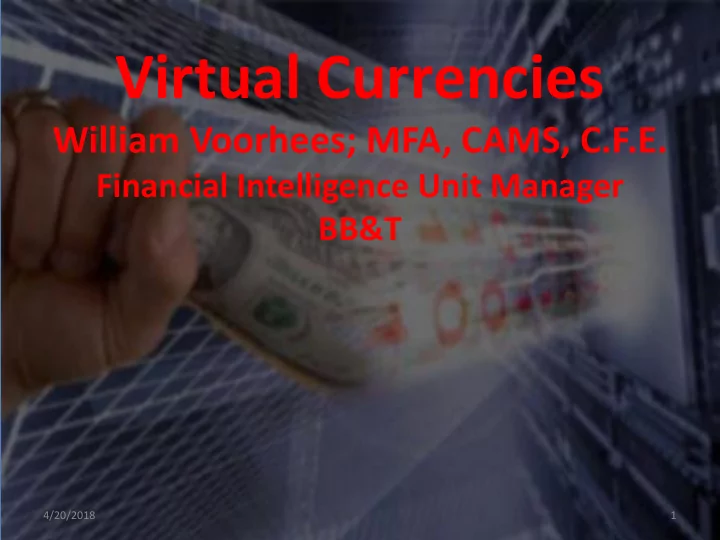

Virtual Currencies William Voorhees; MFA, CAMS, C.F.E. Financial Intelligence Unit Manager BB&T 4/20/2018 1
Ripped from the Headlines! 2
Different than other kinds of value transfer • The Internet is very good at transferring information, but very poor at protecting it. • Centralized databases represent a single point of failure. • Blockchains were developed to protect information in a trustless system. • Digital currency represents incentives for decentralized computers to maintain the Blockchain. 3
Centralized Systems • Account-based online payment systems • Controlled by a single administrating authority • Allow users to store value, transfer funds, receive payments from others • Can deal in fiat or virtual currency • Account for the vast majority of virtual currency transactions
Decentralized Virtual Currency: Bitcoin • Decentralized, peer-to-peer network-based cryptocurrency • Anyone can download the free, open source software • No central issuing authority, monitoring, or oversight
Digital Currencies/Real Purchases 7
What is Bitcoin? Protocol - /n/ - a set of rules and regulations that determine how data is transmitted in telecommunications and computer networking Bitcoin is a protocol released in January 2009 that uses bits to create consensus among entries in a distributed ledger. In practical effect 'bitcoins' are purely digital 'objects' that are intrinsically limited in amount under mathematical law.
Origin • Whitepaper by Satoshi Nakamoto • Bitcoin: A Peer-to-Peer Electronic Cash System • November 1, 2008: Published on The Cryptography Mailing list at metzdowd.com
What do the rules enforce? A protocol that allows for a triple-entry bookkeeping system utilizing a • distributed peer-to-peer network • It is comprised of the world's largest computing network - larger than the 500 largest supercomputers combined. • Ledger entries can be altered by anyone with the 'private key‘ • Fundamental theorem of cryptography: Anything that can be done with a central authority can be done without one.
Distributed Network 11
Blockchain Defined • Blockchain is a cloud based database shared by every participant in a given system • Blockchain consists of blocks that hold time- stamped batches of valid transactions • Each block includes the hash of the prior block, linking the blocks together • The linked blocks form a chain, with each additional block reinforcing those before it • Think of it as a peer-to-peer ledger
13
14
15
Sample “Real-World” Bitcoin Transaction Path Server launches Customer Customer sends Server gets application scans payment receipt Server’s instructions invoice Credit: BitPay
How Blockchain Works Transactions are not valid until added to the Chain. Tampering is immediately evident. The Blockchain is regarded as safe as everyone in the network has a copy.
Public Transaction Ledger •All transactions are published to a public transaction ledger, called the blockchain •Linking real-world identities back to wallet addresses can be difficult
How is BTC initially obtained? In person transactions • (https://localbitcoins.com) – App-based payments – Physical representations (coins, checks, etc) • Exchanges (Coinbase, Bitpay) - registered MSBs Buying/Selling a product for Bitcoin • • Mining (participating in the validation process) • Cypto Currency ATMs: locations (http://coinatmradar.com/) • Online “Faucets”
Exchangers • VC Exchangers : third-party entities that exchange cash, virtual currency, and/or other forms of real money for other forms of the aforementioned currencies • Individuals typically use exchangers to deposit and withdraw money from VC accounts • Accept a wide array of payments, including cash, wires, credit cards, and other VC
Peer to Peer: Moving Value Without an Intermediary YES • Cash • Precious metals and stones • Virtual currency NO • Real estate • Banking • Credit cards • Money transfer businesses • Stored value cards
VC Exchangers
2010 > 2018 Bitcoin Price
2017 > 2018 Bitcoin Price
FinCEN March 18, 2013 Guidance • March 18, 2013, Application of FinCEN’s Regulations to Persons Administering, Exchanging, or Using Virtual Currencies • Interpretive guidance to clarify the applicability of the regulations implementing the BSA to persons creating, obtaining, distributing, exchanging, accepting, or transmitting virtual currencies
Suspicious Activity Reports 27
LocalBitcoins.com 4/20/2018 28
4/20/2018 29
Examples of Recent Investigations 4/20/2018 30
Additional Resources Bitcoin Educational Resources : • http://www.forbes.com/sites/jonmatonis/2013/05/13/6-new-bitcoin-educational- resources/ • Bitcoin Education Project (Udemy) : https://www.udemy.com/bitcoin-or-how-i-learned-to-stop-worrying-and-love- crypto/ • Bitcoin Primer for Policymakers : http://mercatus.org/sites/default/files/Brito_BitcoinPrimer_embargoed.pdf • Bitcoin Wiki : https://en.bitcoin.it/wiki/Main_Page • Cato Unbound-The Private Digital Economy : https://www.cato-unbound.org/issues/july-2013/private-digital-economy • CoinDesk : http://www.coindesk.com/ • Contrarian Compliance : http://contrariancompliance.com/ Let’s Talk Bitcoin : http://letstalkbitcoin.com/ • Khan Academy Bitcoin Series : • https://www.khanacademy.org/economics-finance-domain/core-finance/money- and-banking/bitcoin/v/bitcoin-what-is-it We Use Coins : https://www.weusecoins.com/en/ • 31
Recommend
More recommend